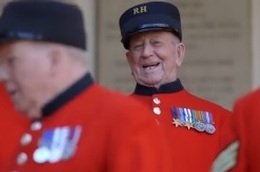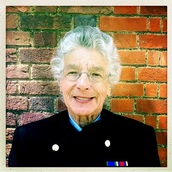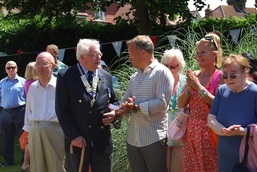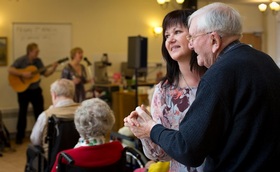Unique camaraderie in care homes for ex-service people down to shared life experiences
 With the hundred year anniversary since the beginning of the First World War this year, care homes for ex-service men and women have pledged to lead the way in commemorations to mark the centenary within their local communities and improve services for its ex-military residents.
With the hundred year anniversary since the beginning of the First World War this year, care homes for ex-service men and women have pledged to lead the way in commemorations to mark the centenary within their local communities and improve services for its ex-military residents.
Chelsea Pensioners
The most famous of these care homes is The Royal Hospital Chelsea, home to world famous Chelsea Pensioners. The care home was founded by King Charles II more than 300 years ago and designed by Sir Christopher Wren who built wards with communal corridors to encourage social interaction.
At the end of 2013, The Royal Hospital Chelsea improved living standards for its Chelsea Pensioners, a group of ex-soldiers who have served their country, to ensure services are modernised with more en suite facilities fitted and residents bedroom refurbished to higher standards.
People who are aged over 65 and have served as a soldier can apply to become a Chelsea Pensioner. It is open to men and women with no dependant spouse or family and who finds themselves in need. A potential Chelsea pensioner must be ‘of good character’ to be considered to become a Chelsea Pensioner. 
Once a Chelsea Pensioner can no longer live in the Long Wards, the sheltered accommodation available at the Royal Hospital Chelsea, they can move into the Infirmary to receive dedicated support and care in the care home environment. The Infirmary is only available to those who have been living in the Long Wards as a Chelsea Pensioner.
Chelsea Pensioner, Alan Lee, joined the army at 14 years old. He served in World War II in the Parachute Regiment.
Mr Lee described the positive impact becoming a Chelsea Pensioner has had on his life, saying: “Friendship hits you from day one, everybody speaks to you, you’ve only got to go and sit in the club and you’re with friends and you sit with people who you think you’ve known for a long time because they have the same interests in life as you have had and the fact is those people, they’re with you for the rest of your life. And I mean the rest of your life.
“Chelsea is second to none for a home, it’s a very happy thing.” He added: “When you wear your Scarlet’s, you are a king in yourself, because you get asked for your photograph all the time, life here is absolutely first class.”
Chelsea pensioner, Marjorie Cole, described her life after joining the army aged 17 to become an army chef.
She said: “I was 17 years old and my father said 'you won't last six weeks'. I thought 'I'll show him.’ 
Describing her move to become a Chelsea Pensioner, Ms Cole said: “I feel proud when I put my scarlet coat on. I feel proud to have served and when I am on parade, I am marching for those we've lost and those that are still serving.
“It's like life really began when I was sixty-five. The atmosphere, the camaraderie is fantastic. No, I love every minute of it.
“I do have a little laugh to myself about my Dad saying I'd only last six weeks in the army. I often think that. I think, if only you could see me! Bless him.
“The majority of the people I went to school with were married by eighteen or nineteen years old with children and I didn't want to do that. I wanted to see something of the world.
“When I look back I think I made the right decision, but especially coming here, after looking after my family, I think I'm getting the reward now.”
The Royal British Legion Poppy Homes
There are now six Poppy homes run by The Royal British Legion which have all been updated since 2002, with three new dementia suites built in the last decade.
“People who have served can have specialist needs which can be both positive and negative. For example, some will have been prisoners of war and might re-live experiences of their past which will be negative for them,” explained Laura Morton, head of care services at The Royal British Legion.
She said: “Residents share a common bond because of their military connections which makes them feel more comfortable in Poppy Homes compared to other homes.

“We need staff to be highly trained to be aware of this and understand the complexities of ex –servicemen living with dementia.”
The Royal British Legion’s Poppy Homes are exclusive to beneficiaries of the Royal British Legion and welcomes all serving or ex-serving people and their dependents.
Ms Morton said: “The main aims for Poppy Homes are aligned with the Legion’s four pillars of welfare, comradeship, representation and remembrance.
“We offer a level of care, to provide care which is flexible to the needs of residents, so they don’t need to move onto other care options. Our homes are able to adapt should their care needs change dramatically. “There is a mutual respect between serving and ex-servicemen,” Ms Morton of the British Legion added.
“Residents have a unique camaraderie because they have a shared service identity and that is a common bond."
For ex-service people who have experienced trauma Poppy homes have also benefited from dementia units providing specialist care required by residents now living with dementia who might have experienced trauma during their military life.
Mr Morton said: “Reminiscence groups are a negative experience for some as they have gone through some sort of negative trauma. Although mainly positive for most people, there is the odd person with dementia who has faced traumatic events which can be prevalent during reminiscence sessions.
“Our dementia care strategy in 2005 included the creation of special purpose built dementia units which are very high spec dementia units. “Each resident has a memory box outside their room, which has memorabilia which connects them to the forces, including pictures of the serving days inside for example.”
Residents share pride in military background
Residents at ex-military care homes share pride in their military background because their military personality is an important part of their own character.
Ms Morton said: “Within the homes, residents are defiantly chatting about the past a lot and our reminiscence groups are really interesting. The guys still like to wear their shirts, ties and medals as they still have a strong military personality.” 
The social interaction for residents within the ex-military settings has been seen to offer rehabilitative services as much as the specialist care provided by the home itself.
Ms Morton described the camaraderie within Poppy Homes, recounting: “One resident with dementia was very withdrawn and disengaged when he first came into the home, and a group of ex-servicemen who were also residents took time to find out his service background.
“They discovered they had been in some of the same conflicts as the man and started to sit with him during meal times. By talking to the resident about their common background, the group managed to help the resident talk and share stories again about his life, because they were able to take him back to a time he could remember well.
“The change in the man was striking and it was through the unique camaraderie of Poppy home residents that these changes can be seen in people.”
Royal Alfred Seafarers’ Society 
The Royal Alfred Seafarers’ Society, a maritime care home based in Surrey was set up in 1865 to care for seafarers’ and their dependents.
Run by former sea farers, the home’s residents are mainly from a Royal or Merchant Navy, Royal Fleet Auxiliary or fishing fleet back ground.
Chief executive of the society, Commander Brian Boxall-Hunt says the home works because it allows ex-seafarers to be among people who have shared life experiences and similar interests.
He said: “We understand life at sea can be a challenging, lonely experience and seafarers prefer to be amongst others with whom to share camaraderie as well as their seafaring stories. The home is a place where residents can come together and be a part of a family.”
Specialist dementia care
The Royal Alfred Seafarers’ Society has been adapting to the changing needs of its residents adding a dementia unit in 2011 due to a rise in residents living with Alzheimer’s disease.
Mr Boxall-Hunt said: “This has allowed to us to increase the level of specialist training and support we can deliver.”
Latest Features News
 25-Nov-19
2019 Election: Boris Johnson leaves social care in 'too difficult box' but Labour vows to end 'crisis'
25-Nov-19
2019 Election: Boris Johnson leaves social care in 'too difficult box' but Labour vows to end 'crisis'
 18-Oct-19
Podcast: Wendy Mitchell and dementia: 'My biggest fear is not knowing who my daughters are'
18-Oct-19
Podcast: Wendy Mitchell and dementia: 'My biggest fear is not knowing who my daughters are'
 27-Sep-19
Exclusive: Care minister backs care workers' call for time off to grieve and attend funerals
27-Sep-19
Exclusive: Care minister backs care workers' call for time off to grieve and attend funerals
 19-Sep-19
Podcast: Gyles Brandreth says poetry helps ward off dementia
19-Sep-19
Podcast: Gyles Brandreth says poetry helps ward off dementia
 30-Aug-19
Edinburgh Fringe funnyman joins comics facing toughest audience at care home gig
30-Aug-19
Edinburgh Fringe funnyman joins comics facing toughest audience at care home gig